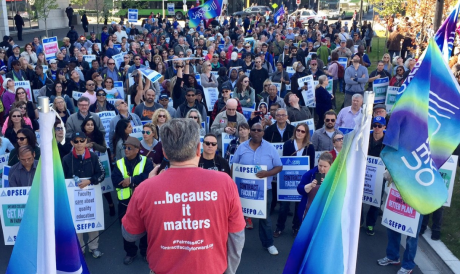Features
You are here
Ontario college strike: #StandWithFaculty

October 31, 2017
Twelve thousand full-time and partial-load college faculty in 24 colleges in Ontario are on strike. The union (OPSEU) demands are focused on three issues: 1) equal pay for equal work and job security for partial load faculty, 2) a 50-50 full-time to contract faculty complement, and 3) more say in academic decision making.
The College Employer Council (CEC), which acts as the bargaining agent for the colleges, has refused to discuss these issues at the bargaining table. They have tabled an offer that includes modest cost-of living wage raises and nothing else.
The employer’s initial strategy was to paint college faculty as highly paid and greedy in the hopes that public opinion and the students would refuse to support them.
Students support faculty
But this strategy is backfiring spectacularly as students, their parents and general public are outraged that 70 per cent of college faculty are precarious workers on four month contracts with minimal to no benefits.
Student support has been tremendous. Students have been on picket lines, organized rallies and petitions and are all over social media with messages of support. Overwhelmingly, the students see the College Employer Council as the focus for their anger, not the faculty.
Striking to end precarious work
This has become a strike about precarious work and it is resonating broadly. New research on jobs in Ontario found that 50 per cent of all workers regardless of their rate of are precarious workers. This strike, and campaigns like the Fight for $15 and Fairness are pushing precarity into the spotlight.
Students, who see their parents in precarious work or who have precarious jobs themselves understand this issue. Students attend college in order to get decent secure jobs but, what an irony that the people teaching them are precarious workers.
What is also ironic is that Wynne’s Liberals are currently trying to pass legislation, Bill 148, to address precarious work. Yet, they have been unwilling to put pressure on the College Employer Council to negotiate fair conditions at the bargaining table. Wynne’s government also has the distinction of funding post-secondary education at the lowest level, per capita, of any province.
Despite Wynne’s labour friendly legislation, her government is not getting the labour peace they hoped for in the lead up to the next election. The Liberals’ tepid attempt to appear worker friendly is being exposed as a thin veil covering underfunding and lack of interest in demanding employers treat workers with respect.
Why this strike matters
A victory in this strike—especially gains on job security and equal pay for equal work for contract faculty—would blow a big hole in the notion that precarious work is the “new norm” that we all must accept. It would give confidence to workers to fight this battle in their own workplace.
Whatever the outcome, this strike changes the discussion around precarious work and shows the power of the voice of workers to put their interests on the agenda when they act together.
What can people do to support it?
Picket lines are up at all 24 colleges and many colleges especially in the GTA have multiple picket locations that people can visit. Write a letter or email your MPP to demand that the get the employer back to the bargaining table.
On Thursday November 2 striking faculty from across the province will take the fight right to Wynne door with a mass rally at Queen’s Park at 12 noon.
Join the public forum “Building solidarity: support the college faculty strike”, Monday November 6, 7pm at Steelworkers Hall (25 Cecil St), organized by the International Socialists
Section:









